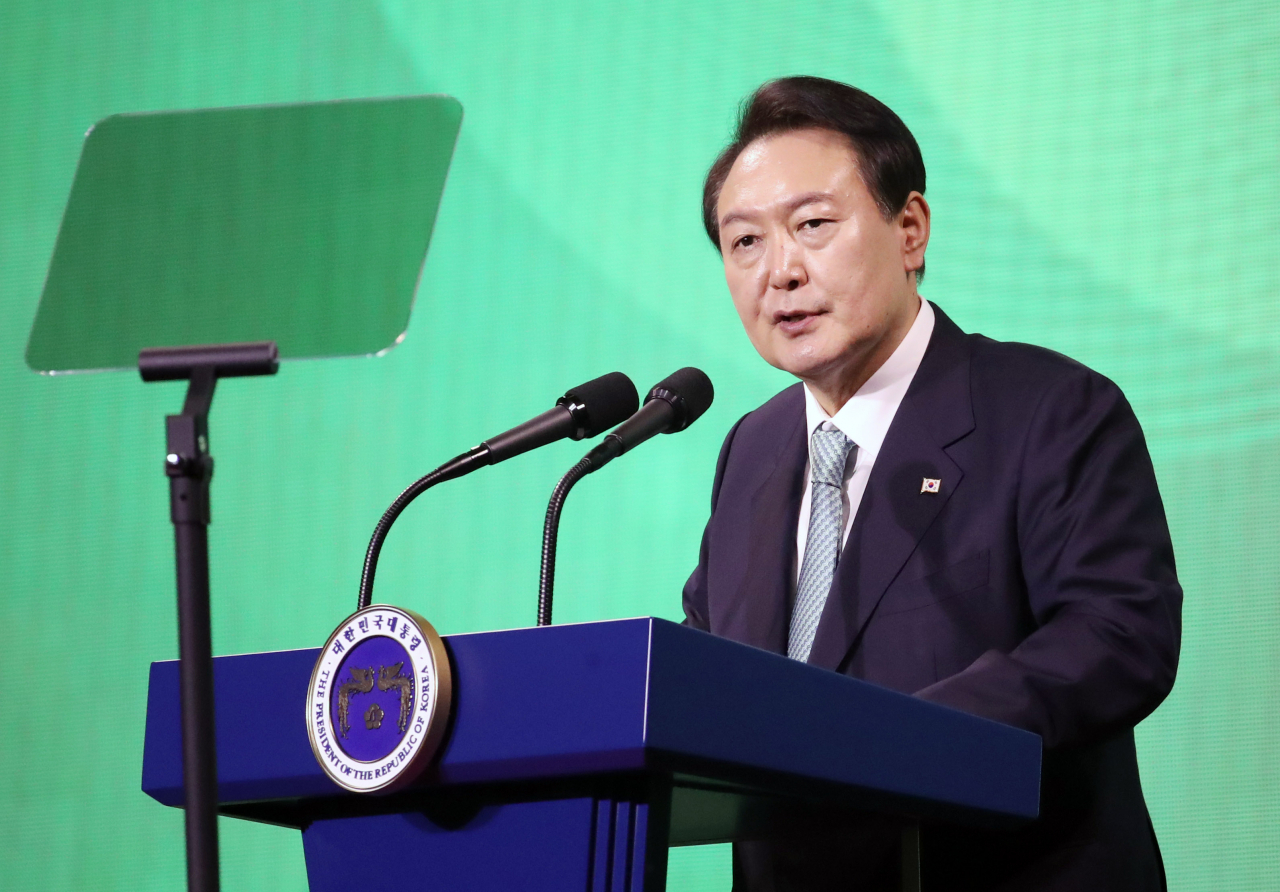Korea stumbles into divisive, risky debate on nuclear redeployment
By Shin Ji-hyePublished : Oct. 13, 2022 - 20:32

While North Korean threats intensify, concerns are growing as the nation’s grave security issues could become political strife.
Although President Yoon Suk-yeol and his office did not publicly admit to reviewing the redeployment of tactical nuclear weapons amid constant threats from North Korea, the information about their moves is constantly being leaked from the government and the ruling party.
When asked about Yoon’s position on related reports, Yoon told reporters Thursday morning, “Right now, there are various opinions on extended deterrence in Korea and in the US, and we are listening carefully and examining various possibilities."
“It is difficult for the president to publicly confirm or explicitly answer these security concerns,” he added.
This year, North Korea has launched ballistic missiles 23 times and cruise missiles twice, with 11 missile launches since Yoon took office in May.
Experts see the North coming closer to completing its nuclear program and time is rife to discuss further extended deterrence as the situation of the regime has changed.
Park Won-gon, a professor in the department of North Korean studies at Ewha Womans University, said, “Previously, (the redeployment) was almost unrealistic, but now it is true that there is still more possible than before.”
“Now is the time to face the uncomfortable truth that complete denuclearization of North Korea is impossible,” Park said. “A new question is how we can coexist with North Korea, which has a nuclear weapon. It's a very different level of threat.”
He showed concerns that the grave security issues could be changed into political strife.
“Serious security issues such as South Korea-US-Japan drills and the relocation of tactical nuclear weapons are made into controversy in the political arena,” he said. “It is a very fatal threat to Korean security. We have to talk about how to respond to the threat.”
Ruling party leader Chung Jin-suk ignited political controversy on Wednesday by calling for abrogating a 1991 inter-Korean declaration on denuclearization, should North Korea go ahead with a seventh nuclear test. This immediately caused backlash from the main opposition Democratic Party, which called for Chung’s resignation.
Several news reports from conservative news media further fanned controversy.
Conservative newspaper Chosun Ilbo reported earlier in the day that the government had requested the US administration to strengthen the US extended deterrence (nuclear umbrella) to the level that South Korea would share US tactical nuclear weapons if North Korea conducts its seventh nuclear test, citing senior government officials. JoongAng Ilbo, another right-leaning newspaper, reported that the government plans to start discussions with the US soon regarding how to make the most of US nuclear capabilities, citing a senior official of the ruling party.
Critics believe the information was deliberately leaked by the government to newspapers for political reasons.
Political commentator Park Chang-hwan said the leak was “politically motivated” because the tactical nuclear redeployment is “unrealistic.”
“If this goes only through the camp logic, it will lead to a political struggle,” Park said. “The redeployment of tactical nukes is dichotomous and the logic of black and white is clearly divided.”
According to a poll conducted in 2017 by the Korea Society Opinion Institute, 68 percent of people favored relocating tactical nuclear weapons. The figure has been consistently used by conservatives to justify the relocation of tactical nuclear weapons.
Lee Sang-hwan, a professor at Hankuk University of Foreign Studies’ Graduate School of Politics, Government and Communication, “(The redeployment) is not that realistic at the moment due to diverse issues like NPT.”
“Deploying tactical nuclear weapons explicitly acknowledges that North Korea possesses nuclear weapons. That could be the basis for shaking up the Treaty on the Non-Proliferation of Nuclear Weapons,” he said.
NPT is an international treaty that aims to prevent the spread of nuclear weapons and weapons technology. Korea officially ratified the treaty in 1975. North Korea ratified it in 1985 and declared its withdrawal from the NPT in January 2003. South Korea has criticized North Korea's development and advancement of nuclear weapons as a direct challenge to the international community's nuclear non-proliferation regime.
“(The ruling party) seems to have the intention to get out of the current situation (low approval ratings) by going into political controversy instead of truly debating our security through the redeployment issue,” Lee said.
“If we go to the simple logic of whether we should just sit and wait while North Korea develops nuclear weapons, many non-experts believe that we should do something like deploying tactical nuclear weapons,” the professor said. “But, in reality, it is not that simple. We should make diverse calculations about whether deploying tactical nuclear weapons is a strategically good choice for us.”











![[Today’s K-pop] BTS pop-up event to come to Seoul](http://res.heraldm.com/phpwas/restmb_idxmake.php?idx=644&simg=/content/image/2024/04/17/20240417050734_0.jpg&u=)





![[KH Explains] Hyundai's full hybrid edge to pay off amid slow transition to pure EVs](http://res.heraldm.com/phpwas/restmb_idxmake.php?idx=652&simg=/content/image/2024/04/18/20240418050645_0.jpg&u=20240418181020)

![[Today’s K-pop] Zico drops snippet of collaboration with Jennie](http://res.heraldm.com/phpwas/restmb_idxmake.php?idx=642&simg=/content/image/2024/04/18/20240418050702_0.jpg&u=)